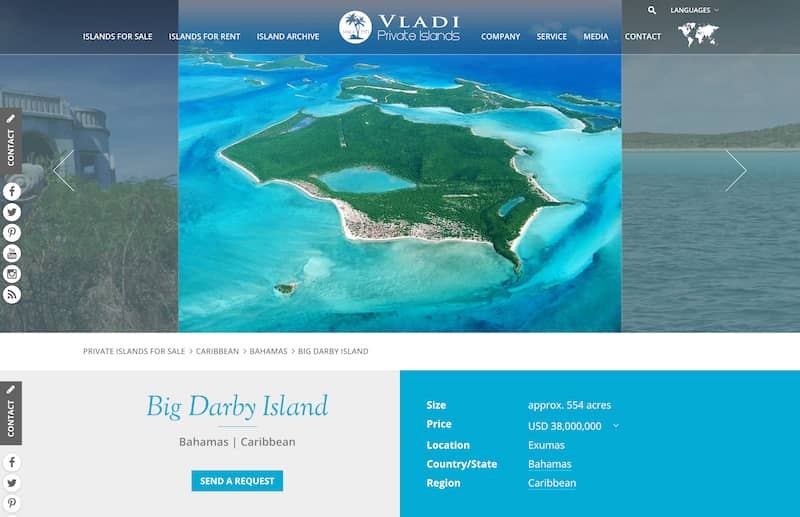One of the latest tasks of Balaji’s 1729 project sparked some distant memories I had almost 20 years ago: how do you start a country?
I still remember it quite vividly: I received a book as Christmas present in 2002 titled Katalog der Träume. It was a hard-cover online shopping guide filled with various cool-looking products and gadgets, like digital cameras and fancy looking flip phones. It was the kind of book that made you dream of cool things. But one page really captured my 12-year old attention: it was an article about a real-estate agency specialised in islands. Islands, I though to myself! Can you really buy them?
It turns out you can and that real-estate agency still exists: Vladi Private Islands based in Hamburg, Germany. They have pretty much everything from the small island in Sweden to 500 acres tropical properties similar in size to city states like Monaco.

~ 550 acres island for sale in the Bahamas for a cool $38M.
I looked through the listings at that time and it just twisted my mind that you can buy a piece of land and potentially create your own state. My funds back then didn’t allow me to pursue this venture any further but it was a memorable Gedankenexperiment: what does it take to start a country? Assume I buy the island, can I just declare independence - let’s say from Canada? Novia Scotia has some cheap islands!
That would probably be similar to Michael Scott declaring bankruptcy:
But there’s the thing: according to the Montevideo Convention on the Rights and Duties of States Article 1
The state as a person of international law should possess the following qualifications: (a) a permanent population; (b) a defined territory; (c) government; and (d) capacity to enter into relations with the other states.
So that sounds quite manageable? In reality you would still need to argue with your actual host country why you deserve to be independent (and risk the invasion of your newly formed country). Or do you? If you read the story about Rajneeshpuram, it shows that there are indeed examples of communities taking over whole cities and (legally!) installing their own government. The playbook seems straightforward:
- create and assemble a community,
- establish rules of this community (e.g. imposed by the leaders or agreed upon by members in some fashion),
- buy a patch of land,
- start working and living there (optionally),
- win majority in local city councils & aspire to win seats in county elections by poisoning salad bars with salmonella ?
Alright, let’s skip the last part, yes?
Virtual Countries in 2021
So how would you do this in 2021? What are the options in a world where communities are forming online around supra-national concepts and ideas such as blockchains?
With the slow erosion of the heavily indebted nation-state and further alienation of taxpayers to sustain it, new ways of creating alternative forms of governance will arise. How long will it take until we have new, imagined countries? Already today we may feel closer to people we meet and online than our physical neighbours next door.
The possibility to start a new country by building an initial community around a common cause online and then crowdfund the acquisition of physical land doesn’t seem too unrealistic. The tech is here already, we just not to use it. What do we need to make such a new cloud-country happen?
Here are some ideas:
- sell tokens of the new cloud-country and earmark proceeds for the acquisition of land and important infrastructure (power, sewage and other essential utilities),
- on-chain governance structure similar to a DAO (decentralised autonomous organisation) that codifies most important governance functions needed (e.g. elections, referendums and deployment of capital for state expenditures)
Do you actually need to physically move to this new country as a citizen? Not at all: in the same spirit as E-Residency programms like Estonia’s, you don’t have to physically live there to enjoy benefits of being part of that community. The country in itself also does not have to be a continuous patch of land. You can think of it as a union of dispersed states that are connected through the common believe in a consitution/charter. This could allow for land-property owners (regardless of location) to stake their property to the new cloud-country, thereby extending land-mass and potential power to engage and negotiate with other nations.
I have mentioned Charter Cities before and I encourage you to read Scott Alexander’s detailed article on Prosperá. The article contain lots of interesting bits about how Prosperá structured its governance model.
Next steps?
I have created this publicly-editable Google Sheet to compile a list of cloud-countries and charter city projects. Additionally, there’s also a reading-list to add to the discussion. This will help us (or at least me) to get an idea what the status-quo of these communities actually is, so any additions are welcomed and in fact encouraged! I would love to hear your feedback, either through email or on Twitter.